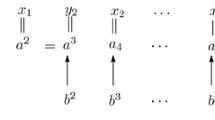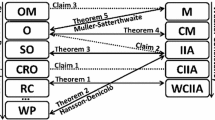Abstract
This paper criticizes non-constructive uses of set theory in formal economics. The main focus is on results on preference aggregation and Arrow’s theorem for infinite electorates, but the present analysis would apply as well, e.g., to analogous results in intergenerational social choice. To separate justified and unjustified uses of infinite populations in social choice, I suggest a principle which may be called the Hildenbrand criterion and argue that results based on unrestricted axiom of choice do not meet this criterion. The technically novel part of this paper is a proposal to use a set-theoretic principle known as the axiom of determinacy (\(\mathsf {AD}\)), not as a replacement for Choice, but simply to eliminate applications of set theory violating the Hildenbrand criterion. A particularly appealing aspect of \(\mathsf {AD}\) from the point of view of the research area in question is its game-theoretic character.
Similar content being viewed by others
References
Aumann, R. J., Markets with a continuum of traders, Econometrica 32(1–2):39–50, 1964.
Bedrosian, G., A. Palmigiano, and Z. Zhao, Generalized ultraproduct and Kirman-Sondermann correspondence for vote abstention, in Proceedings of LORI 2015, 2015, pp. 27–39.
Bell, J. L., The axiom of choice, in E. N. Zalta, (ed.), The Stanford Encyclopedia of Philosophy, summer 2015 edn., http://plato.stanford.edu/archives/sum2015/entries/axiom-choice/ 2015.
Bell, J. L., Toposes and Local Set Theories: an Introduction, vol. 14 in Logic Guides, Oxford University Press, 1988.
Bernays, P., A system of Axiomatic Set Theory: Part III. Infinity and enumerability. Analysis, The Journal of Symbolic Logic 7(2):65–89, 1942.
Boolos, G., The iterative conception of set, The Journal of Philosophy 68(8):215–231, 1971.
Brunner, N., and H. R. Mihara, Arrow’s theorem, Weglorz’ models and the Axiom of Choice, Mathematical Logic Quarterly 46(3):335–359, 2000.
Chichilnisky, G., and G. Heal, Social choice with infinite populations: construction of a rule and impossibility results, Social Choice and Welfare 14(2):303–318, 1997.
Diaconescu, R., Axiom of choice and complementation, Proc. Amer. Math. Soc. 51(1):176–178, 1975.
Fishburn, P. C., Arrow’s impossibility theorem: concise proof and infinite voters, Journal of Economic Theory 2(1):103–106, 1970.
Forster, T., The iterative conception of set, The Review of Symbolic Logic 1:97–110, 2008.
Fraenkel, A. A., Y. Bar-Hillel, and A. Levy, Foundations of Set Theory. Second Revised Edition, vol. 67 of Studies in Logic and the Foundations of Mathematics, Elsevier, 1973.
Goodman, N., and J. Myhill, Choice implies excluded middle, Mathematical Logic Quarterly 24(25–30):461–461, 1978.
Hamkins, J. D., The set-theoretic multiverse, Review of Symbolic Logic 5:416–449, 2012.
Hellman, G., Does category theory provide a framework for mathematical structuralism?, Philosophia Mathematica 11(2):129–157, 2003.
Herzberg, F., and D. Eckert, Impossibility results for infinite-electorate abstract aggregation rules, Journal of Philosophical Logic 41(1):273–286, 2011.
Herzberg, F., and D. Eckert, The model-theoretic approach to aggregation: Impossibility results for finite and infinite electorates, Mathematical Social Sciences, Computational foundations of social choice 64(1):41–47, 2012.
Herzberg, F., L. Lauwers, L. van Liedekerke, and E. S. Fianu, Addendum to L. Lauwers and L. Van Liedekerke Ultraproducts and aggregation [J. Math. Econ. 24 (3) (1995)], Journal of Mathematical Economics 46(2):277–278, 2010.
Hildenbrand, W., On economies with many agents, Journal of Economic Theory 2(2):161–188, 1970.
Jech, T. J., The Axiom of Choice, vol. 75 of Studies in Logic and the Foundations of Mathematics, Elsevier, 1973.
Kanamori, A., The Higher Infinite: Large Cardinals in Set Theory from Their Beginnings, Springer Monographs in Mathematics, Springer Berlin Heidelberg, 2008.
Kechris, A. S., The axiom of determinancy implies dependent choices in L(\(\mathbb{R}\)), The Journal of Symbolic Logic 49(1):161–173, 1984.
Kechris, A. S., Classical Descriptive Set Theory, Graduate Texts in Mathematics, Springer New York, 1985.
Kirman, A. P., and D. Sondermann, Arrow’s theorem, many agents, and invisible dictators, Journal of Economic Theory 5(2):267–277, 1972.
Kuratowski, K., and A. Mostowski, Set Theory, vol. 53 of Studies in Logic and the Foundations of Mathematics, Elsevier, 1968.
Lambek, J., and P. J. Scott, Introduction to Higher Order Categorical Logic, no. 7 in Cambridge studies in advanced mathematics, Cambridge University Press, 1986.
Lauwers, L., Ordering infinite utility streams comes at the cost of a non-Ramsey set, Journal of Mathematical Economics 46(1):32–37, 2010.
Lauwers, L., Intergenerational equity, efficiency, and constructibility, Economic Theory 49(2):227–242, 2012.
Lauwers, L., and L. Van Liedekerke, Ultraproducts and aggregation, Journal of Mathematical Economics 24(3):217–237, 1995.
Martin-Löf, P., 100 Years of Zermelo’s Axiom of Choice: What was the Problem with It?, Springer, Netherlands, Dordrecht, 2009, pp. 209–219.
Martin-Löf, P., and G. Sambin, Intuitionistic type theory, Studies in proof theory, Bibliopolis, 1984.
McLarty, C., Two constructivist aspects of category theory, Philosophia Scientae (Cahier spécial 6):95–114, 2006.
Mihara, R. H., Arrow’s theorem and Turing computability, Economic Theory 10(2):257–276, 1997.
Mihara, R. H., Arrow’s theorem, countably many agents, and more visible invisible dictators, Journal of Mathematical Economics 32(3):267–287, 1999.
Monjardet, B., Chapter 5 - on the use of ultrafilters in social choice theory, in P. K. Pattanaik, and M. Salles, (eds.), Social Choice and Welfare, vol. 145 of Contributions to Economic Analysis, Elsevier, 1983, pp. 73–78.
Mycielski, J., On the axiom of determinateness, Fundamenta Mathematicae 53(2):205–224, 1964.
Mycielski, J., On the axiom of determinateness (II), Fundamenta Mathematicae 59(2):203–212, 1966.
Mycielski, J., and H. Steinhaus, A mathematical axiom contradicting the axiom of choice, Bulletin de l’Académie Polonaise des Sciences 10:1–3, 1962.
Mycielski, J., and S. Świerczkowski, On the Lebesgue measurability and the axiom of determinateness, Fundamenta Mathematicae 54(1):67–71, 1964.
Ostroy, J. M., and W. R. Zame, Nonatomic economies and the boundaries of perfect competition, Econometrica 62:593–633, 1994.
Parsons, C., What is the iterative conception of set?, in R. E. Butts, and J. Hintikka, (eds.), Logic, Foundations of Mathematics, and Computability Theory, vol. 9 of The University of Western Ontario Series in Philosophy of Science, Springer Netherlands, 1977, pp. 335–367.
Pitts, A., Nominal techniques, ACM SIGLOG News 3(1):57–72, 2016.
Pitts, A. M., Nominal Sets: Names and Symmetry in Computer Science, vol. 57 of Cambridge Tracts in Theoretical Computer Science, Cambridge University Press, 2013.
Pivato, M., Additive representation of separable preferences over infinite products, Theory and Decision 77(1):31–83, 2014.
Shelah, S., Can you take Solovay’s inaccessible away?, Israel Journal of Mathematics 48(1):1–47, 1984.
Sierpiński, W., Sur une proposition qui entraîne l’existence des ensembles non mesurables, Fundamenta Mathematicae 34(1):157–162, 1947.
Solovay, R. M., A model of set-theory in which every set of reals is Lebesgue measurable, Annals of Mathematics 92(1):1–56, 1970.
Sørensen, M. H., and P. Urzyczyn, Lectures on the Curry-Howard Isomorphism, vol. 149 of Studies in Logic and the Foundations of Mathematics, Elsevier Science Inc., New York, NY, USA, 2006.
Steel, J. R., What is ...a Woodin cardinal?, Notices of the AMS 54(9):1146–1147, 2007.
Svensson, L.-G., Equity among generations, Econometrica 48(5):1251–1256, 1980.
Zame, W., Can intergenerational equity be operationalized?, Theoretical Economics 2:2, 2007.
Author information
Authors and Affiliations
Corresponding author
Additional information
Special Issue: Logics for Social Behaviour
Edited by Alessandra Palmigiano and Marcus Pivato
Rights and permissions
About this article
Cite this article
Litak, T. Infinite Populations, Choice and Determinacy. Stud Logica 106, 969–999 (2018). https://doi.org/10.1007/s11225-017-9730-3
Published:
Issue Date:
DOI: https://doi.org/10.1007/s11225-017-9730-3




